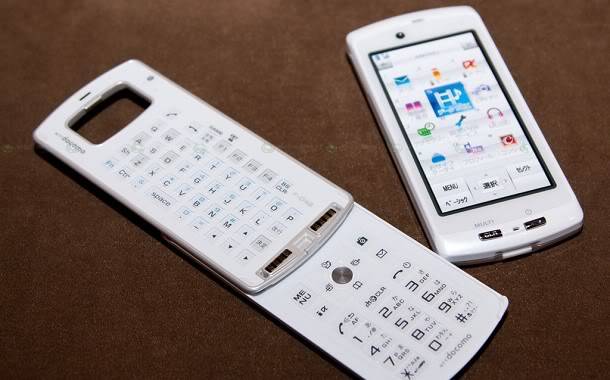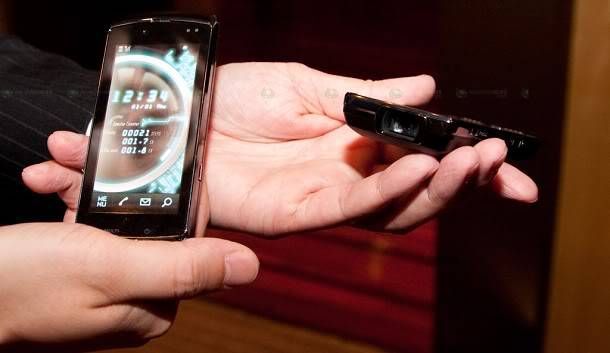harpreetji
Rags to Riches
You can’t deny modular handsets may just be the future of mobile phones
Let’s face it, phones are getting big….over the last six months we’ve had the release of a series of touchscreen phones that have pushed the boundaries of the term ‘mobile’. Samsung have released the Omnia 2 and the Omnia HD, both of which sported 3.7” screens. Toshiba unleashed the TG01 with its massive 4.1” screen, Acer the NeoTouch with a 3.8” screen and lately HTC have topped them all with the HD2 and its massive 4.3” screen.

But I think soon we are going to reach a tipping point. Those 4.3” are probably the limit of what people are going to be willing to carry around all day. I mean, people are going to start looking a bit silly holding these huge slabs of plastic up to their ears.
So it was with interest that I read on Akihabara News about a new handset released in Japan by Fujitsu whose various parts – screen, QWERTY and alphanumeric keyboard, mini-projector – can all be detached from each other and used separately. The screen can be used by itself to watch TV or films, surf the internet or you can connect it up to the keyboard for gaming action or messaging.
A few years back mobile phone manufacturers were obsessed with making their handsets as thin and as small as possible. Each new phone proclaimed itself “the thinnest handset in the world”. People now want more functionality from their phone: bigger screens, faster processors, more apps, hardware keyboards, the more bells and whistles the better and they seem willing to put up with less pocketable handsets to get that.
Enter the modular handset – such as the one by Fujitsu. Now, of course the chances of us seeing released outside of Japan are virtually zero. But I think that Fujitsu might be onto something with this idea of being able to detach and reattach hardware to give the phone different functions based on user needs. When traveling and listening to music or watching video we can just pull out the screen, when we need to give a presentation we whip out and attach the projector. When we know we are going to be doing some serious gaming, we reattach the keyboard.

Ok, I can see the disadvantages as well: it’s a damn sight easier to lose ‘bits’ of your phone and you can’t always predict what hardware you will need (you suddenly want to show some video to friends and you’ve left the projector at home). But I think mobile manufacturers need to come up with innovative ways of dealing with the increased demands of phone users and the idea of modules that you can attach/detach from your phone is an attractive one.
Unfortunately, the idea doesn’t seem to take off in the Western world. Carriers are the biggest clients for handset manufacturers and usually the biggest clients call the shots. In the case of the modular phone system by Modu, they had quite a hard time getting the the support of the major carriers. Word is we’ll be finally seeing Modus sold through some major channels next year. But we ‘re yet to see a modular phone system from a major manufacturer.
Let’s face it, phones are getting big….over the last six months we’ve had the release of a series of touchscreen phones that have pushed the boundaries of the term ‘mobile’. Samsung have released the Omnia 2 and the Omnia HD, both of which sported 3.7” screens. Toshiba unleashed the TG01 with its massive 4.1” screen, Acer the NeoTouch with a 3.8” screen and lately HTC have topped them all with the HD2 and its massive 4.3” screen.

But I think soon we are going to reach a tipping point. Those 4.3” are probably the limit of what people are going to be willing to carry around all day. I mean, people are going to start looking a bit silly holding these huge slabs of plastic up to their ears.
So it was with interest that I read on Akihabara News about a new handset released in Japan by Fujitsu whose various parts – screen, QWERTY and alphanumeric keyboard, mini-projector – can all be detached from each other and used separately. The screen can be used by itself to watch TV or films, surf the internet or you can connect it up to the keyboard for gaming action or messaging.
A few years back mobile phone manufacturers were obsessed with making their handsets as thin and as small as possible. Each new phone proclaimed itself “the thinnest handset in the world”. People now want more functionality from their phone: bigger screens, faster processors, more apps, hardware keyboards, the more bells and whistles the better and they seem willing to put up with less pocketable handsets to get that.
Enter the modular handset – such as the one by Fujitsu. Now, of course the chances of us seeing released outside of Japan are virtually zero. But I think that Fujitsu might be onto something with this idea of being able to detach and reattach hardware to give the phone different functions based on user needs. When traveling and listening to music or watching video we can just pull out the screen, when we need to give a presentation we whip out and attach the projector. When we know we are going to be doing some serious gaming, we reattach the keyboard.

Ok, I can see the disadvantages as well: it’s a damn sight easier to lose ‘bits’ of your phone and you can’t always predict what hardware you will need (you suddenly want to show some video to friends and you’ve left the projector at home). But I think mobile manufacturers need to come up with innovative ways of dealing with the increased demands of phone users and the idea of modules that you can attach/detach from your phone is an attractive one.
Unfortunately, the idea doesn’t seem to take off in the Western world. Carriers are the biggest clients for handset manufacturers and usually the biggest clients call the shots. In the case of the modular phone system by Modu, they had quite a hard time getting the the support of the major carriers. Word is we’ll be finally seeing Modus sold through some major channels next year. But we ‘re yet to see a modular phone system from a major manufacturer.
